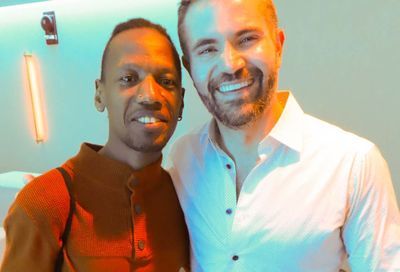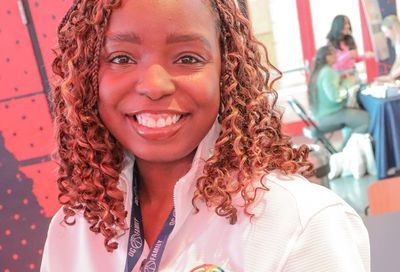And Now, Your Local Forecast
by Will Doig
For infotainment at its best, you can’t beat your local TV news affiliate.
Unlike the national broadcast, delivered with an icy sense of professionalism, the local news is stocked with amateurish, mid-budget, anything-can-happen blooper potential. But for all its technical difficulties and verbal pratfalls, it sallies forth intact, and the glue that holds it together is the five-day forecast and your trusty TV weatherman.
|
Meteorologists are the wacky next-door neighbors in the sitcom that is local news. They pop their heads in, levy a well-timed bon mot regarding atmospheric conditions, and disappear just as quickly. They are easily the most animated of the news team; the sports guy’s shoulder-punching jock brand of humor is jarring and loud, and the investigative reports, though amusing in their own way, are still morbidly obsessed with what products are slowly killing us.
But weather is fun. It’s cute little graphics of clouds with puffy cheeks blowing cold air from the northeast. And weather is exciting. It’s Doppler radar and Accuweather and Code Reds and small craft advisories.
But mostly, weather demands description, which makes the job of on-air meteorologist that much more critical. Washington’s heat demands an edgy syntax and a willingness to use words that might seem a little intense. Words like smothering. Stifling. Sweltering. Blinding. And the mother of all heat words, oppressive.
To those living under actual totalitarian regimes who would snicker to hear Americans call a hot day oppressive, I invite you to spend an August hunkered down on the third floor of a Columbia Heights group house with unconditioned air. If you’re not lying naked on the hardwood floor with a bottle of gin by mid-month, you’re cut out for dictatorship.
Every oppressed citizenry needs a leader to look to for hope. South Africa had Mandela. Cuba had Che. Washington has meteorologist Bob Ryan.
Bob Ryan is the chief on-air meteorologist for NBC local affiliate, News 4. He uses the word oppressive more often than WJLA’s Doug Hill and WUSA’s Topper Shutt combined. This is a man who is not afraid to stand up and speak truth to power and tell it like it is. If you’re looking for a sugar-coated forecast, don’t look to Bob Ryan. If the weather’s oppressive, he’ll tell you.
Still, the use of such language cannot be taken lightly. What qualifies the use of a word like "oppressive"? Are there industry standards? Federal laws? A congressional committee reviewing the matter?
"That’s a good question," said Connie Malko of The Weather Channel, America’s round-the-clock television source for climatic updates. Connie doesn’t know the answer, but she does know that "when they’re sitting at the anchor desk, that’s scripted. There’s someone who figures out what they’re going to say."
Connie didn’t know if it’s a meteorologist who does the scripting, but said she would make some phone calls and get back to me, and in the meantime why don’t I try the National Weather Service, a division of the National Oceanic and Atmospheric Administration.
"Well, we use words like warm and hot or humid and hazy to describe the weather," said Dewey Walston, Chief Forecaster in the National Weather Service’s Baltimore/Washington office. "If it’s January and it’s 80 degrees, it’s warm. If it’s July and it’s 80 degrees, it’s not."
Dewey’s analysis of the situation seemed to indicate that the use of the word oppressive is more a question of what the weather feels like, and indeed, many forecasts offer a "feels like" temperature along with the actual temperature. When asked how this "feels like" number is calculated, Dewey tried not to sound condescending as he assured me that it’s "a long equation." A quick Internet search turned up the equation, which is indeed long and is called the Heat Index. This is what it looks like:
HI = (- 42.379 + 2.04901523 * t + 10.14333127 * r – .22475541 * t * r – (6.83783e – 3) * t ^ 2 – (5.48 1717e – 2) * r ^ 2 + (1.22874e – 3) * t ^ 2 * r + (8.5282e – 4) * t * r ^ 2 – (1.99e – 6) * t ^ 2 * r ^ 2)
Hoping that the "feels like" question would get the "oppressive" question answered, I contacted Lorrie Pearson at the Department of Environmental Programs, part of the Metropolitan Washington Council of Governments. Lorrie wasn’t sure about the use of "oppressive," but knew quite a bit about Code Reds and the Air Quality Index, and embarked on a lengthy explanation, utilizing phrases like "ground level ozone" and "parts per billion."
|
At this point, Connie from The Weather Channel called back and left this message on my voicemail while I was out getting a sandwich:
“Hi Will, this is Connie Malko. I talked to someone about your question. The on-camera people are told to talk in a conversational manner, to stay away from clichés and to be accurate with all the information. That’s what I found out. Thank you. Goodbye.”
Confident that progress was being made, I called Brian de Graaff, a producer at the weather desk at ABC’s local affiliate, WJLA.
“We try not to sensationalize the weather,” deflected Brian. “We use words like ‘hot,’ ‘very’ and ‘super.’ We use flame graphics to indicate heat. But we do not sell the weather.”
Is Bob Ryan selling us weather with his recurrent and flagrant use of the word “oppressive”? An unsettling prospect for a fan like myself, and one that demanded an answer from the horse’s mouth.
“There are no guidelines,” said Bob. “I tend to base my use of ‘oppressive’ on humidity. When the dew point is 70 or higher, that’s oppressive. When it’s above 60, that’s just ‘very humid.'”
Bob went on to explain that a temperature in the 90s is “hot,” high 90s is normally described as “very hot,” over 100 is “extremely hot” and an official heat advisory earns itself a “dangerously hot.” He said that he generally steers clear of words like “searing,” which imply a more arid desert setting.
“At times, even if it’s only in the 80s, it can still be ‘oppressive’ because of the humidity,” explained Bob, who has been to the Amazon and once described Washington’s weather in an on-air broadcast as “Amazonian.”
“Sometimes I’ll mention that it’s hotter here than it is in, say, Calcutta,” said Bob. This, of course, carries the danger of accidentally comparing our oppressive heat to the weather in an oppressive nation (i.e. “D.C. is more oppressive than Baghdad today, where the current temp is a balmy 72.”)
Clearly, the tricky business of weather semantics is best left to the professionals. Bob’s other favorite weather word is “scrumptious,” but whatever the weather, he always tells it like it is.
See also:
- It’s the Heat. And the Stupidity by Sean Bugg
- Melting Point by Jonathan Padget
Support Metro Weekly’s Journalism
These are challenging times for news organizations. And yet it’s crucial we stay active and provide vital resources and information to both our local readers and the world. So won’t you please take a moment and consider supporting Metro Weekly with a membership? For as little as $5 a month, you can help ensure Metro Weekly magazine and MetroWeekly.com remain free, viable resources as we provide the best, most diverse, culturally-resonant LGBTQ coverage in both the D.C. region and around the world. Memberships come with exclusive perks and discounts, your own personal digital delivery of each week’s magazine (and an archive), access to our Member's Lounge when it launches this fall, and exclusive members-only items like Metro Weekly Membership Mugs and Tote Bags! Check out all our membership levels here and please join us today!




















